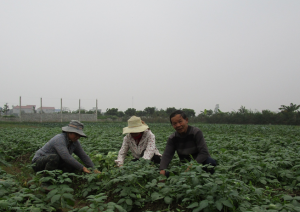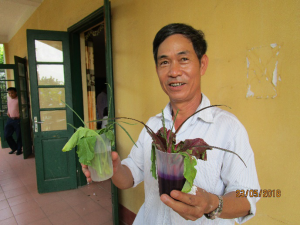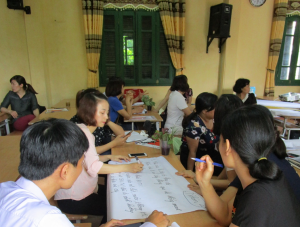Background information

Project “Capacity building of the leaders and core trainers of Community Learning Centers (CLC) on the use of pesticides, growth agents to adopt sustainable farming practices – ensuring hygiene, food safety, protection of environment and agrobiodiversity” was formulated by the Hanoi Department of Education and Training (Hanoi DoE&T), and co-implemented by Hanoi DoE&T and ICERD. In which ICERD provides training and technical support. Project duration was 12 months, in 2018.
Project aims at improving the management capacity for over 200 leaders and core staff of 88 Community Learning Centers in 4 suburban districts of Hanoi, including (Me Linh, Soc Son, Dong Anh and Hoai Duc) on the use of pesticides, growth agents to adopt sustainable farming practices – ensuring hygiene, food safety, protection of environment and agrobiodiversity.
Main activities
Learning the experiences in the safe production model, environmental protection
Over 200 leaders and core staff of 88 Community Learning Centers in 4 suburban districts of Hanoi visit to the famer’s farms to learn about the typical model of the safe production before they participated in the training course.
Training on capacity building
Organize training for over 200 leaders and core staff of 88 Community Learning Centers in 4 suburban districts of Hanoi attend training. Training aims at improving the knowledge and management skills on the use of pesticides, growth agents to adopt sustainable farming practices.
Training on planning skills
Organize training courses for over 200 leaders and core staff of 88 Community Learning Centers in 4 suburban districts of Hanoi to improve knowledge and planning skills on organizing the training for local authorities and farmers on the food safety production.
CLC developed a proposal to organize training courses for farmers
(After training) Project management board (Hanoi Department of Education and Training) requests each CLC to make 01 proposal for organizing training for farmers in order to have report product; used them to evaluate training results and effectiveness.
Organize training on marketing skill and mobilize the resources and finance
Organizing training courses for over 200 Leaders and key staff of CLCs in 4 suburban districts of Hanoi to improve the marketing skill, mobilize the resources and finance to support and enhance the quality of CLC’s activities.
Develop proposals on mobilization of support resources
After training, Project management board (Hanoi Department of Education and Training) requests each CLC to make 01 proposal on mobilizing the resources to support the CLC’s activities as the report products, used to evaluate training results / effectiveness.
Organize the workshop on the linkage and collaboration
Workshop organized for over 150 participants who are from CLCs and concerned parties, food safety product consumption units.
Major achievements

Learning the experiences in the safe production model, environmental protection
Over 200 leaders and core staff of 88 Community Learning Centers in 4 suburban districts of Hanoi, including (Me Linh, Soc Son, Dong Anh and Hoai Duc) visited and learnt the experience of the Community Learning Centre (CLC) of Quynh Son and Xuan Phu communes on the organizing the pesticide impact assessment/pesticide risk reduction and promotion of sustainable conservation and use of agrobiodiversity.
About Quynh Son, Xuan Phu – Yen Dung district – Bac Giang province
In recent years many rice production area has been affected more frequently flooding due to heavy rains, which causing losses of rice. To compensate for the loss of revenue from rice by flooding, many farmers wanted to intercropping “fish and rice”, however, fish farming in rice fields not favorable due to the misuse of chemical pesticides has adversely affected to the fishes, on the other hand, farmers also lack skills in integrated rice-fish farming.
Raising pigs and chickens and cattle is common practice in many communes in Yen Dung to serve the nutritional needs for the family and for sale, buffaloes for plough and harrowing. However, due to the narrow campus of house’s garden, so where livestock are usually adjacent to resident, this situation caused the stench. To limit odour, many families have made investments in the cement floor to facilitate the rinse, cage wash water be poured into the sewer pit in the village, causing the stench and pollution rural environment. In order to help farmers to reduce pesticide risk and promote the sustainable conservation and use of agrobiodiversity, since 2014, with support from the regional CSO The Field Alliance/Thai Education Foundation, the Center of Initiatives on Community Empowerment and Rural Development (ICERD) has collaborated with The Department of Continuing Education – Ministry of Education and Training (MoET) and Plant Protection Department (PPD) – MARD has supported Bac Giang province to conduct the Project “Rural Ecological Agriculture for Livelihood (REAL)” activities at Yen Dung District – Bac Giang province, including 2 Quynh Son and Xuan Phu communes.
Under the program, there have been a variety of the activities organized by social organizations, farmers, students, and commune Peoples’ Committee with their own resources to sustain the program, such as:
> Activities on pesticide risk reduction and ecological agriculture have been absorbed into the mainstream of the Commune People’s Committee strategic Plan on agricultural production and rural development;
> Renovation and upgrading of the irrigation system to create favorable conditions for apply SRI and apply Integrated Rice-Fish cultivation;
> System of Rice Intensification (SRI), response to climate change: SRI is applied to improve rice production as well as to create a suitable ecosystem for fish such as wide spacing. Furrows are created to improve drainage and also allow fishes enter to the field.
> Communities have mobilized fund to construct the Cement tanks for containing the pesticide containers for disposal;
> Conservation and use of fish and aquatic animals in rice field. Integration rice-fish-duck: Fish and ducks play a role in weed and pest control and thereby reduce herbicide and pesticide use and labor cost. (Increase profit by 5 to 10 times in comparison with growing only rice)
> “Integration of vegetables-livestock production” through bio mats and composting: Many farms are raising pigs and chickens to serve the nutritional needs of the family and to generate income. However, livestock is usually kept nearby the house and cause pollution. Bio mats are formed by a mixture of fermented bio-agents with biomass and mulch from the floor of the livestock’s stables. This to speed up manure decomposition, and deodorize foul-smelling and poisonous gas from the shed. The residues of bio-mats is used to make compost as alternative to chemical fertilizer in crop production.
> “Green environment day” organized by students to sensitize local communities on environmental issues and the need for sustainable farming practices.
> Students, especially from boarding school have maintained the cultivation, and use of indigenous vegetables/medicinal plants through “Home Garden”/”School Garden”, apply integrated crop-livestock production, production of the alternatives to chemicals.
> Creation of a Woman’s Club: exchanging and sharing experiences on the conservation of aquatic animals and fish in rice fields, IPM, SRI, vegetable growing techniques, alternatives to chemical inputs, health and nutritional issues.
> Support to advocacy and information and dissemination of knowledge
> Market access, such as: farmer groups have maintained the contracts with the restaurants for production and selling the product, such as pesticide free vegetables, and fishes from the Integration rice-fish / rice-fish-duck.
Activities of the study visit
Participants visited and exchanged with farmers about experiences, difficulties and solutions to overcome difficulties to enhance production. As follows:
> Visit a the farm of Mr. Chien on Integrated Rice-Fish cultivation
> Visit concentrated rice-fish production areas
> Visit the farms with “Integration of vegetables-livestock production” through bio mats and composting, including visit “Home Garden”.
> Visit the field area where construction of cement tanks for disposal of pesticide containers after use
The participants were very satisfied with the opportunity to visit and appreciate the efforts of CLC and the farmer’s initiatives in Quynh Son and Xuan Phu. The participants also expressed their plan of applying the experience gained from this study tour.
Training of Trainers (TOT)

With collaboration and assistance of ICERD, the Department of Education and Training of Ha Noi province organized the Training of Trainers (TOT) for staff of the CLCs and Semi-boarding Schools within Hanoi province. The aim was to improve knowledge of PIA and conservation and use of agrobiodiversity build the capacity for CLCs in order to organize the FFS on PIA and sustainable conservation of agrobiodiversity. There were four R-TOT organized (5 days / course).
Participants included staff of 88 CLC of 4 districts (Dong Anh, Soc Son, Hoai Duc, Me Linh) of Hanoi and teachers of 20 Semi-boarding schools
Contents of TOT include: Principles of System Rice Intensification (SRI); pesticides impact on human health and the environment; conservation and application of agricultural biodiversity; application of biological bedding/bio-mats in livestock to minimize environmental pollution and composting methods; standards and regulations related to safe vegetable production to improve nutrition and health; cultivation techniques to enhance the ability to cope with climate change and enhance / improve the ecosystem.
Immediately after the end of the course in 2018, all of 88 CLCs have completed the action plan regarding pesticide risk reduction, food safety, sustainable conservation and use of agrobiodiversity. The action plans are conducted in 2019.
Particularly, there are 2 CLCs (My Thanh – My Duc and Quang Tien – Soc Son) organized activities right after training. The activities organized including 19 different activities with 665 farmers involved, of which 397 woman (60%woman). Activities area: Conduct training on ABD for farmers and community planning; conduct training on PIA for farmers and community planning; conduct training on making bio-fertilizer (Composting/Bio Mat for farmers) activity); technical training for farmers on “Household’s Herbal Garden, nutrient and health, and Gender Issues”; training for farmers the conservation and utilization of agrobiodiversity; training on Pesticide Risk Reduction for farmer (2 CLC x 01 activity); community workshop to establishment of Baseline survey to analyze Gender Technical training for farmer groups.
Workshop on linkage and cooperation for Food safety

ICERD in collaboration with TFA to support the Department of Education and Training of Ha Noi province to organize “Workshop on connect cooperation: Community Learning Centre (CLC) – school – society in the training and use of the safe products within Hanoi province” on December 27, 2018.
The workshop aims to provide an forum for the participants to know each other to find the safety products providers (from CLCs) supply for the Semi-Boarding Schools, communities, search for alternative of chemical inputs for farming, share experiences on pesticide risk reduction, sustainable agro-biodiversity conservation and utilization application associated with the safe product production.
Participants included 200 people including leaders of Hanoi Department of Education and Training, District Education Office Training School, Education and Training Offices of 4 districts (Me Linh, Soc Son, Dong Anh, Hoai Duc), leaders and officials of 88 CLC of 4 districts (Me Linh, Soc Son, Dong Anh, Hoai Duc), semi-boarding schools have kitchens for students of 12/30 districts of Hanoi, companies providing biological products for the safe farming, Department of Crop Production and Plant Protection under the Department of Agriculture and Rural Development (DARD) of Hanoi.
Inception Workshop of the Project on Building capacity for CLC on pesticide impact assessment (PIA), agrobiodiversity conservation and use (ABD)
ICERD in collaboration with TFA to support to organize the MoET’s Inception Workshop of the Project “Training to strengthen the capacity of core staff of Community Learning Centers on the use of pesticides, safe growth agents in farming and – contributing to ensuring hygiene, food safety, environmental protection, biodiversity ” (two days workshop), 17 and 18 January 2018.
It aims at sharing the experience of organizing the CLC activities of Thailand related to the PIA and sustainable Conservation and Utilization of Agro-bio and Vietnam’s experience in supporting CLCs in adoption of PIA and sustainable Conservation and Utilization of Agro-biodiversity within the REAL project organized by ICERD.
Participants included more than 200 people including: Leaders and staff of the Department of Education and Training of Hanoi, Education and Training Office of 4 districts (Me Linh, Dong Anh, Soc Son, Hoai Duc), leaders and staff of 88 CLCs of 4 districts (Me Linh, Dong Anh, Soc Son, Hoai Duc), teachers of 20 semi-boarding schools.


